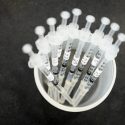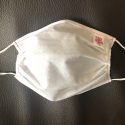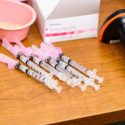COVID questions: What’s the difference in the tests?
Editor’s note: This ongoing series answers questions about COVID-19 and the pandemic. If you have a question to submit, please email it to covid19update@uc.wisc.edu. See answers to previous COVID questions, and visit our COVID-19 impact site.
What is the difference between antibody, antigen, and PCR testing?
There are two kinds of tests for COVID-19: Tests to detect an active SARS-CoV-2 (the virus that causes the disease) infection in a person and tests to detect antibodies the immune system makes against SARS-CoV-2.
Tests that detect active SARS-CoV-2 infections have two main parts. First, there is the kind of sample taken to look for the virus. This could be the infamous nasopharyngeal swab (the deep nasal swab sometimes jokingly called a brain swab), or a sample of saliva.
PCR tests look for the virus’s genetic material. PCR is an extremely sensitive technique — it can detect very small amounts of genetic material in a swab or saliva sample. In most people, it seems that contagiousness begins a day or two before the onset of symptoms. But in most infected people there seems to be a period of time after symptoms end in which there is a small amount of virus remaining. This small amount can be detected by very sensitive PCR tests, but it is not enough to transmit to another person. That is, after symptoms resolve, you might be positive by PCR, but not contagious. (For this reason, it would be helpful if PCR test results reported the amount of virus detected, and not just “positive” or “negative.” Then doctors could have a better sense of whether someone might be contagious to others.)
This is where antigen tests come in. They can use the same sorts of samples that PCR tests do, but instead of looking for genetic material, they look for pieces of the virus itself, called antigens. Antigen tests are rapid — they can give results in just minutes. Right now, it seems like antigen tests are almost as good as PCR at detecting SARS-CoV-2 — IF the person being tested has symptoms and has had them for a week or less. The data on this is not as solid, but antigen tests seem to be less reliable in people who do not have symptoms. We need more studies to know whether antigen tests will be a good tool for screening people without symptoms.
Antibody testing is used to detect antibodies the immune system makes against SARS-CoV-2. These tests require a blood sample and are most commonly used to find out if someone had or was exposed to SARS-CoV-2 in the past. Most antibody tests results are just given as positive or negative. Being antibody-positive does not necessarily mean that you are immune to SARS-CoV-2, or that you will not become susceptible to it in the future.
In any question about testing, it’s important to add that we all need to keep up our other prevention strategies, like distancing and masking, whether we get tested or not. A negative test today does not mean that you will be negative tomorrow.
– Thomas Friedrich, Professor, Pathobiological Sciences; Virology Services unit head, Wisconsin National Primate Research Center
If a child was 11 years old when they received the first dose of the vaccine, but they turned 12 years old prior to getting the second dose, what will that second dose be – pediatric or adult? If adult, is it safe in terms of protection and side effects?
Children should receive the vaccine dose which is appropriate for their age at the time of vaccination. For some children, this may mean receiving a large dose in a subsequent vaccine administration.
In general, the COVID-19 vaccines have been extraordinarily safe across the age range. I would consider the above situation both effective and safe.
For more information on safety, see:
https://www.cdc.gov/mmwr/volumes/70/wr/pdfs/mm705152a1-H.pdf
– Jonathan L. Temte, Associate Dean for Public Health and Community Engagement, University of Wisconsin School of Medicine and Public Health
See more answers to COVID questions at news.wisc.edu/tag/covid-questions/. Also, visit our COVID-19 impact site.



